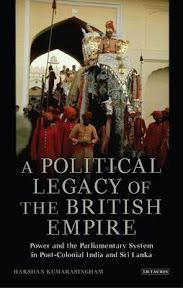Kumarasingham: A Political Legacy of the British Empire
Kumarasingham, Harshan:
A Political Legacy of the British Empire : Power and the Westminster System in Post-Colonial India and Sri Lanka / Harshan Kumarasingham. - London : I. B. Tauris, 2013. - xiv, 297 S. : Ill., Kt. - (International library of twentieth century history ; 54)
ISBN 978-1-78076-228-9
£ 59,50
DDC: 954.04
Beschreibung
As the British Empire receded, India and Sri Lanka, then known as Ceylon, preserved the ‘Westminster’ political system left by their colonial rulers. Both South Asian countries became independent in the late 1940s, though in widely differing styles: India fought a violent campaign of mass political activism and would become a republic, while Sri Lanka negotiated independence by a gentlemen’s agreement among the indigenous elite and remained a realm. Both nations adopted the ‘Westminster’ political system of their colonial master, producing results and reactions that would shape each country profoundly.
Harshan Kumarasingham analyses the crucial first decade of independence, assessing the events, decisions and political environment of these ‘Eastminsters’. The impact of cultural conditions on the constitutional and political exercise of executive power gives an invaluable insight into how the ambiguous and flexible tenets of the Westminster system were interpreted in a local context, where the Western-educated elites were often at variance with the masses. The principles of cabinet government are explored to examine how successfully the purported checks and balances of the Westminster model operated in this crucial nation-building era, along with the critical role of political figures like Prime Ministers Nehru and Bandaranaike. This period also witnessed the early challenges of forging a modern state with major ethnic, linguistic, religious, class-based and regional tensions, which both India and Sri Lanka still wrestle with.
The adaptable Westminster system was an essential element in the political development of these South Asian nations. Understanding the legacy and influence of the Westminster system allows the reader to fully understand the politics, institutions and society of today’s India and Sri Lanka. [Verlagsinformation]
Inhalt
Preface and Acknowledgments. viii
Maps of India and Sri Lanka. xiii
1. Eastminster - The Westminster System in India and Sri Lanka. 1
2. Mixed Messages? India's Responses to its British Legacy. 25
3. The Indian Version of First Among Equals - The Battle for Executive Ascendency. 46
4. Indian Federalism - A Paramount Mechanism. 90
5. 'Think of Ceylon as a little bit of England' - Sri Lanka and the British Legacy. 114
6. Unconventional Conventions - Power Partnerships in the Sri Lankan Executive. 137
7. Sri Lankan Communalism - A 'Canker' Ignored? 171
8. India and Sri Lanka's Eastminsters Compared. 202
9. Conclusion. 227
Notes. 233
Appendix: Governors-General, Presidents and Prime Ministers of India and Sri Lanka in the Post-Independence Decade. 275
Bibliography. 277
Index. 293
Autor
HARSHAN KUMARASINGHAM holds a PhD in Political Science from Victoria University of Wellington, New Zealand, where his doctorate was awarded the Sir Desmond Todd Prize. He is Alexander von Humboldt Research Fellow at the University of Potsdam, Henry Charles Chapman Fellow in Commonwealth Studies at the Institute of Commonwealth Studies, University of London and is a Fellow at the Centre for Strategic Studies, New Zealand. Profile page (University Potsdam).
Quellen: I. B. Tauris; WorldCat; Amazon (UK); Blackwell's Bookshop; Kinokuniya Bookweb
Bildquelle: I. B. Tauris, London
Bibliographie: [1]
References
- (2013). A Political Legacy of the British Empire: Power and the Westminster System in Post-Colonial India and Sri Lanka. International Library of Twentieth Century History; 54. xiv, 297 S.
Ähnlich
- Biedermann: The Portuguese in Sri Lanka and South India
- Llewellyn-Jones: Last King in India
- After Timur Left
- Fischer-Tiné: Shyamji Krishnavarma
- Cederlöf: Founding an Empire on India's North-Eastern Frontiers
- Kingship in Kaśmīr (AD 1148–1459)
- Francis: Le discours royal dans l'Inde du Sud ancienne 1
- Horstmann: Jaipur 1778
- Avelar: História de Goa
- Paranjape: Making India

